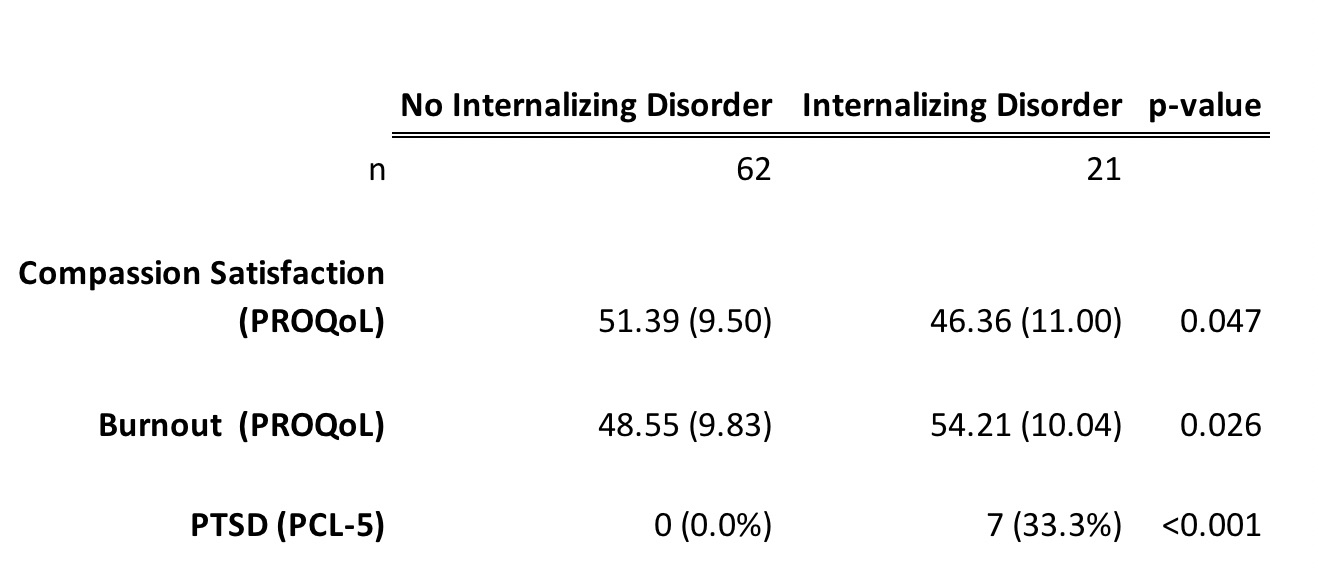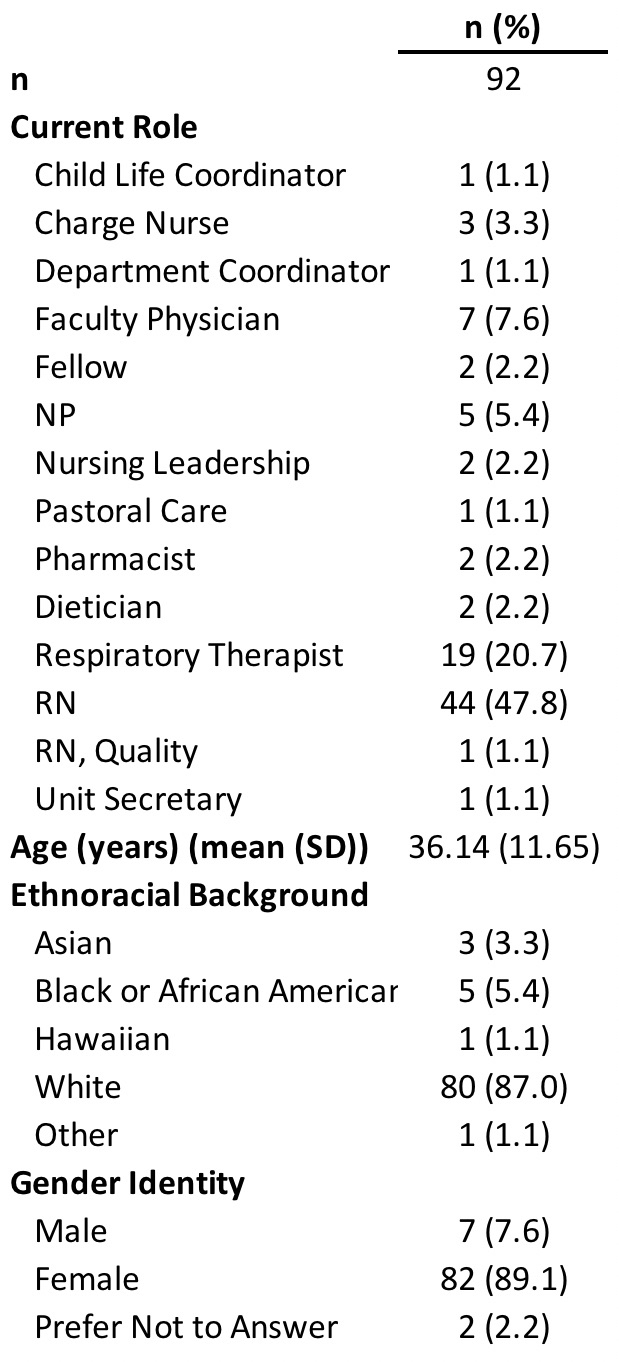Critical Care
Category: Abstract Submission
3: Critical Care I
20 - Burnout and Compassion Satisfaction in PICU Staff
Friday, April 22, 2022
6:15 PM - 8:45 PM US MT
Poster Number: 20
Publication Number: 20.102
Publication Number: 20.102
Jason Werner, Saint Louis University, St. Louis, MO, United States; Fletcher Hoague, Saint Louis University School of Medicine, St. Louis, MO, United States; Benjamin M. Rooney, United States Department of Veterans Affairs, Chicago, IL, United States; Melinda J. Owens, Saint Louis University, New Athens, IL, United States; Elisabeth C. DeMarco, Saint Louis University School of Medicine, Saint Louis, MO, United States; Paula Buchanan, Saint Louis University School of Medicine, Saint Louis, MO, United States; Lauren R. Draper, Saint Louis University School of Medicine, Saint Louis, MO, United States
- FH
Fletcher Hoague, MPH, MSW, LMSW
Program Specialist
Saint Louis University School of Medicine
St. Louis, Missouri, United States
Presenting Author(s)
Background: Pediatric Intensive Care United (PICU) healthcare professionals are repeatedly exposed to traumatic events and environments, leading to burnout, symptoms of traumatic stress, internalizing disorders (ID) (i.e., depression and anxiety) and reduction in compassion satisfaction. “Compassion satisfaction” is the positive feelings one experiences from helping others. These may affect the ability of PICU healthcare personnel to provide compassionate care.
Objective: To determine the prevalence of post-traumatic stress symptoms and ID in PICU staff of various professional backgrounds and to what degree burnout and compassion satisfaction are experienced by PICU staff.
Design/Methods: Surveys were distributed to all PICU healthcare professionals at a large, Midwestern, university-associated freestanding children’s hospital in both online and paper formats. Surveys used validated scales measuring depression (PHQ-9), anxiety (GAD-7), compassion satisfaction and burnout (PROQoL subscales), and post-traumatic stress symptoms (PCL-5). All surveys with partially missing data were analyzed where data was available. Scales were scored according to published guidelines.
Results: 101 online responses were started with 92 responses marked “finished” by subjects. A total of 83 surveys were completed. Results were analyzed using Fisher’s Exact and independent samples t-tests. Given the large degree of overlap in between depression and anxiety, as well as the modest sample size, 21 subjects with moderate or greater responses (score ≥ 10) on PHQ-9 or GAD-7 were included in a single “internalizing disorders” (ID) analysis group. PICU staff in the ID group reported less compassion satisfaction (51.39 [SD = 9.5] vs 46.36 [SD=11.0] p=0.047) and higher burnout (48.55 [SD=9.83] vs 54.21 [SD=10.04] p=0.026) than those not classified with ID. All subjects that screened positive for PTSD on the PCL-5 (n=7) were from the ID group (p≤0.001)Conclusion(s): 25% of PICU staff displayed some evidence of an internalizing disorder. These staff report less compassion satisfaction and more burnout . All PICU staff that screened positive for PTSD also display evidence of suffering from anxiety and/or depression symptoms. Limitations on this data include significant crossover in subjects with positive screens for both depression and anxiety. Future research should address strategies to mitigate staff suffering from symptoms of internalizing disorders, particularly as it relates to their work in the PICU. This work was supported by a grant from the Midamerica Transplant Foundation.
Figure 2 Compassion, Burnout, and PTSD sorted by presence of Internalizing Disorder. Data for PROQoL subscales are presented as t-score mean (standard deviation). PCL-5 data are number of subjects meeting screening criteria and percent of subgroup.
Compassion, Burnout, and PTSD sorted by presence of Internalizing Disorder. Data for PROQoL subscales are presented as t-score mean (standard deviation). PCL-5 data are number of subjects meeting screening criteria and percent of subgroup.
Figure 1 Subject demographics
Subject demographics
Objective: To determine the prevalence of post-traumatic stress symptoms and ID in PICU staff of various professional backgrounds and to what degree burnout and compassion satisfaction are experienced by PICU staff.
Design/Methods: Surveys were distributed to all PICU healthcare professionals at a large, Midwestern, university-associated freestanding children’s hospital in both online and paper formats. Surveys used validated scales measuring depression (PHQ-9), anxiety (GAD-7), compassion satisfaction and burnout (PROQoL subscales), and post-traumatic stress symptoms (PCL-5). All surveys with partially missing data were analyzed where data was available. Scales were scored according to published guidelines.
Results: 101 online responses were started with 92 responses marked “finished” by subjects. A total of 83 surveys were completed. Results were analyzed using Fisher’s Exact and independent samples t-tests. Given the large degree of overlap in between depression and anxiety, as well as the modest sample size, 21 subjects with moderate or greater responses (score ≥ 10) on PHQ-9 or GAD-7 were included in a single “internalizing disorders” (ID) analysis group. PICU staff in the ID group reported less compassion satisfaction (51.39 [SD = 9.5] vs 46.36 [SD=11.0] p=0.047) and higher burnout (48.55 [SD=9.83] vs 54.21 [SD=10.04] p=0.026) than those not classified with ID. All subjects that screened positive for PTSD on the PCL-5 (n=7) were from the ID group (p≤0.001)Conclusion(s): 25% of PICU staff displayed some evidence of an internalizing disorder. These staff report less compassion satisfaction and more burnout . All PICU staff that screened positive for PTSD also display evidence of suffering from anxiety and/or depression symptoms. Limitations on this data include significant crossover in subjects with positive screens for both depression and anxiety. Future research should address strategies to mitigate staff suffering from symptoms of internalizing disorders, particularly as it relates to their work in the PICU. This work was supported by a grant from the Midamerica Transplant Foundation.
Figure 2
 Compassion, Burnout, and PTSD sorted by presence of Internalizing Disorder. Data for PROQoL subscales are presented as t-score mean (standard deviation). PCL-5 data are number of subjects meeting screening criteria and percent of subgroup.
Compassion, Burnout, and PTSD sorted by presence of Internalizing Disorder. Data for PROQoL subscales are presented as t-score mean (standard deviation). PCL-5 data are number of subjects meeting screening criteria and percent of subgroup.Figure 1
 Subject demographics
Subject demographics